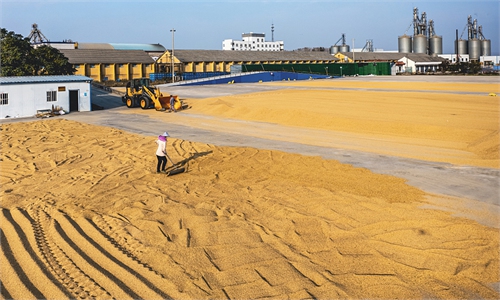
Aerial photo taken on Sept. 2, 2021 shows farmers operating harvesters to reap corn crops in the field of Pingluo County, northwest China's Ningxia Hui Autonomous Region.Photo:Xinhua
A move by China to start importing corn from Brazil may affect the corn trade structure with the US as China has not imported large amounts of corn from Brazil in the past nine years, Bloomberg reported.
Liu Dong, a corn analyst from Mysteel Group, told the Global Times on Friday that it will take two to three months for corn from Brazil to reach ports in China, and it might go into the national reserves instead of being distributed to the market.
The Bloomberg report said on Thursday that China has already reserved 250,000 to 400,000 tons of corn from Brazil, citing anonymous sources.
Corn imports from Brazil could reshape China's current corn import structure. Some 70 percent of China's corn imports in 2021 came from the US and 29 percent were from Ukraine. The Bloomberg report said that exploring the Brazilian market could affect the structure of corn trade between China and the US.
China’s General Administration of Customs and the Brazilian Ministry of Agriculture signed the Protocol on Phytosanitary Requirements for exporting Brazilian corn to China (revised edition), according to a statement on the website of China’s Ministry of Commerce on May 24.
The Global Times learned that the two countries signed a previous protocol in 2014, but China has barely imported corn from Brazil in recent years.
Liu noted that the majority of Chinese enterprises gave up on Brazilian corn due to the long shipping time and high freight cost, while relevant government approval for genetically modified imports also added to the difficulty of importing it.
Liu added that with the increase in domestic demand for corn, supply and demand has been gradually tightened. The imports of corn reached 11.29 million tons in 2020 and continued to increase to 28.36 million tons in 2021, hitting a record high.
Meanwhile, China’s imports of corn from Ukraine have decreased since the Russia-Ukraine conflict, falling to 700,000 tons in April. Liu said there is a need to expand the channels for domestic corn imports under such circumstances.
The Bloomberg report noted that China importing corn from Brazil may encourage Brazilian farmers to grow more corn, which would take away some market share from the US. Brazil's corn exports to China in April 2022 reached 35,000 tons, and were the only corn exports to China since 2019.
Liu noted that importing corn from Brazil suits both countries. Brazilian corn is cheaper and will also help reduce the risks of importing from only one country.
“Currently, the prices for US corn are rising sharply, leading to a passive rise in China's import costs. It will be meaningful for China to explore new sources of corn imports from the perspective of food security,” Liu Said.
However, imports related to genetically modified products still need to be validated by the Ministry of Agriculture and Rural Affairs. Liu noted that progress might be made as the agreement is being further promoted, which will broaden trade channels and improve the country’s ability to cope with the risk of fluctuation in global grain prices.

